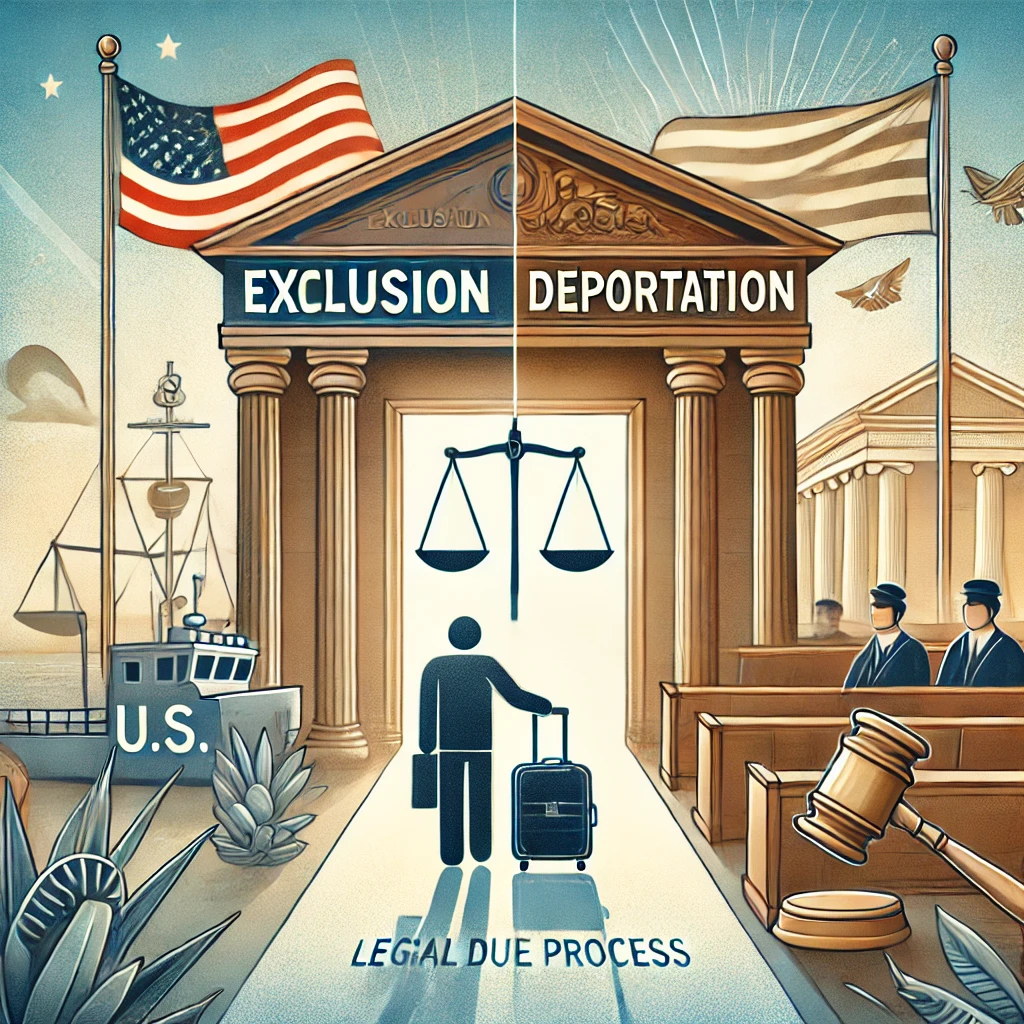
Exclusion vs. Deportation Hearings: What Are Your Rights as a Returning Resident Alien?
As a lawful permanent resident returning to the U.S. after a brief trip abroad, what are the key differences between exclusion and deportation hearings, and what due process rights do I have if the government initiates exclusion proceedings?
Understanding Exclusion and Deportation Proceedings
- Deportation Hearings: Used for individuals already physically present in the U.S., often near their residence. Deportation proceedings require a minimum of seven days’ notice of charges and allow direct appeals to the Court of Appeals if the government prevails.
- Exclusion Hearings: Used for individuals seeking admission to the U.S., typically held at ports of entry. Unlike deportation, exclusion hearings do not require advance notice of charges. Instead, notice can be given during the hearing itself, as long as the individual has a reasonable opportunity to respond.
Key Differences in Proceedings
- Location: Exclusion hearings occur at ports of entry, while deportation hearings happen near the individual’s U.S. residence.
- Notice Requirements: Deportation requires seven days’ advance notice of charges; exclusion does not.
- Appeals: Deportation decisions can be appealed to the Court of Appeals, but exclusion decisions may only be challenged through a habeas corpus petition.
- Substantive Rights: Deportation offers additional rights, such as the ability to request voluntary departure or suspension of deportation, and in some cases, designation of the country of deportation.
Returning Resident Aliens and the Concept of “Entry”
The term “entry” is pivotal in determining whether an individual is subject to exclusion or deportation proceedings. According to Section 101(a)(13) of the Immigration and Nationality Act (INA):
- A lawful permanent resident (LPR) is not deemed to make an “entry” upon returning to the U.S. after an “innocent, casual, and brief” trip abroad.
- However, if the LPR engages in activities contrary to U.S. immigration law, such as attempting to smuggle individuals, their departure may be considered “meaningfully interruptive” of their residence, and they will be subject to exclusion proceedings.
Due Process Protections for Returning Resident Aliens
While nonresident aliens seeking initial admission have limited constitutional protections, lawful permanent residents returning from brief trips abroad are entitled to due process. Courts evaluate due process adequacy based on:
- Individual’s Interest: The right to reside and work in the U.S. and to reunite with family.
- Risk of Erroneous Deprivation: The likelihood of unfair outcomes due to procedural deficiencies.
- Government’s Interest: Efficient enforcement of immigration laws and control over U.S. borders.
Applying the Due Process Standard
In cases like Maria Antonieta Plasencia, where a resident alien briefly left the U.S. but was charged with aiding unlawful entry, courts determined:
- The exclusion hearing must provide sufficient procedural safeguards to ensure fairness.
- The hearing’s procedures must meet minimum due process requirements, such as the opportunity to present evidence and request a continuance if necessary.
Practical Steps for Returning LPRs Facing Exclusion
- Seek Legal Counsel: An experienced immigration attorney can evaluate whether your actions abroad constitute a “meaningful departure” and assist with procedural challenges in exclusion hearings.
- Understand Your Rights: Familiarize yourself with procedural safeguards, including the right to present evidence and request a continuance.
- Prepare Evidence: If charged, compile documents demonstrating your ties to the U.S., such as family relationships, employment, and community involvement.
Authoritative Resources
- INA Section 101(a)(13)
- Rosenberg v. Fleuti, 374 U.S. 449 (1963)
- Board of Immigration Appeals (BIA) Precedents
- USCIS Overview of Removal Proceedings
Conclusion
Exclusion and deportation hearings differ significantly in procedure and the rights afforded. As a returning lawful permanent resident, understanding these distinctions and preparing for potential exclusion proceedings are critical to safeguarding your legal rights. Working with an attorney can help ensure fairness and compliance with due process standards.
Key Takeaway for Readers with Limited Knowledge
If you are a lawful permanent resident returning from a brief trip abroad, your due process rights protect you from arbitrary exclusion. While nonresident aliens have limited protections, returning LPRs are entitled to procedural fairness, including notice and a meaningful opportunity to respond before exclusion.
Let’s Get Started
Your legal challenges deserve personalized attention and innovative solutions. Contact Oware Justice Advocates PC today for a consultation and take the first step toward resolution and peace of mind.
355 South Teller Street, Suite 204,
Lakewood, CO 80226
(Visits to the office are strictly by appointment only)
303-514-6589

